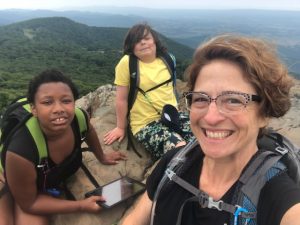I’m a Homeschooling Noob
My kids and I have embarked upon our first year of homeschooling. The journey actually started in 2018, when my son’s health began impeding his ability to attend school consistently. Since then, I have traveled through the five stages of beginning to homeschool. It’s been fun. Join me, won’t you?
Stage 1: No Way
In early 2020, when Covid was still a thing in another part of the world, my son was hospitalized and missed six weeks of school. I started to consider homeschooling, an idea that really never crossed my mind, except when I would think, “Oh hell no, I’d never homeschool.” Admittedly, I had an image of homeschoolers that was uninformed and unfair. But I also had very little confidence in myself as a teacher of young humans.
Then the schools closed in March. Those last few months of virtual school were a disaster. The teachers did the best they could, but I hated watching my kids sit in front of their computers for hours on end. I wanted to get them out of the house, to go on hikes and nature walks – but I couldn’t because they were anchored to their computers. It was the first time I felt like I could do a better job teaching them than the professionals.
But then my husband was furloughed for six months, and we panicked at the idea of spending money on something we were already paying for with our taxes. I took on a part-time consulting gig, and we muddled through another year of online schooling.
Stage 2: Research and Rabbit Holes
I took that time to research curricula. My starting point was my cousin, who had homeschooled her kindergartner and told me about the curriculum she used. “It’s the Waldorf method,” she explained. I acted like I knew what that meant and bought the curriculum. It was on sale – only $600! Unfortunately, I quickly realized that I am not a Waldorf mom, and implementing that curriculum would be torture.
What am I then, I wondered? A Charlotte Mason, mom? An eclectic mom? A classical mom? A game schooling mom? Talk about an existential crisis.
Along came the rabbit holes. So many rabbit holes. Homeschooling YouTube channels. E-newsletters. Blogs. I subscribed to them all and began to drown in options.
Stage 3: I Will Fail
Next came self-doubt. I’m not a teacher. I’m impatient. I lack self-discipline. I’m terrible at math. I would be unable to meet the needs of my neurodivergent children.

And speaking of them, I doubted them too. They wouldn’t crack open a book if their lives depended on it. And, if left to their own devices, they would only play video games and eat potato chips. As I saw it, the chances were high that either they would commit mutiny, or I’d run screaming for the hills, never to be seen or heard from again.
Stage 4: Just Listen
Still unsure of how I could do this successfully, I started reaching out. I participated in a few My School virtual meetups and attended the Organization of Virginia Homeschoolers virtual conference this spring. I started listening to parents who had many years of homeschooling under their belts. What they almost universally said was, “We started out with the schedules and the books and the curriculum, but we realized that didn’t work for us…” and they would explain what self-directed learning was and what it looked like in their homes.
Self-directed learning (also called self-directed education or unschooling) allows the learners to take the lead in figuring out what they need and want to learn and go about figuring how to do it with guidance from their parents/teachers, rather than direct instruction. I’m still figuring out how this looks for my family, but when I learned about it, it felt like the right fit for us.
Stage 5: Remember to Breathe
I took a breath.
One morning, around that same time, my daughter detailed how, in one of her favorite video games, she figured out that if she didn’t spend any (of the virtual) money and instead worked on her tasks with other players, her money would start to grow. Then, she excitedly explained, if she stayed in the game but left the computer to do something else, her virtual money would increase by X dollars over Y amount of time, “and that equals…” She paused briefly while she worked out the multiplication in her head – and came up with the right answer. (I checked … on my calculator.)
Financial literacy AND double-digit multiplication. In a video game. That she was playing on her own. Because she wanted to.

We can do this.
I still purchased (different, non-Waldorf) curricula, and we are starting out with schedules and lesson plans because I need a starting point, a launchpad. But I put them together with the kids’ consultation and with the knowledge of what gets them excited to learn. I also believe that what we start out with will probably be different in one month, three months, or next year. Because learning is fun, it’s fluid, and it’s everywhere, and I know that they will get what they need when they need it.
So, uh, anyone want some Waldorf curriculum, never used?
Carlea Bauman spent three decades working in politics and health advocacy. She has successfully driven advocacy and communications efforts for diabetes and anti-tobacco organizations, run two start-up nonprofits in the cancer field and worked on education and community engagement for a food allergy organization. She sits on the Board of Directors for Sambhali U.S., which supports women and girls in Rajasthan, India, who seek to raise their voices with dignity and self-confidence and determine their own destinies. She has campaigned on behalf of the Equal Rights Amendment in Virginia and with Moms Demand Action. In her free time, you will find her hiking in Shenandoah National Park or trying to grow food in her nearby community garden plot.
Opinions expressed by individual writers in this blog do not necessarily reflect the views of the Board of Directors of The Organization of Virginia Homeschoolers, nor do they represent an official position of VaHomeschoolers. Writers’ views are their own, and readers are encouraged to research and explore homeschooling issues to their own satisfaction.
